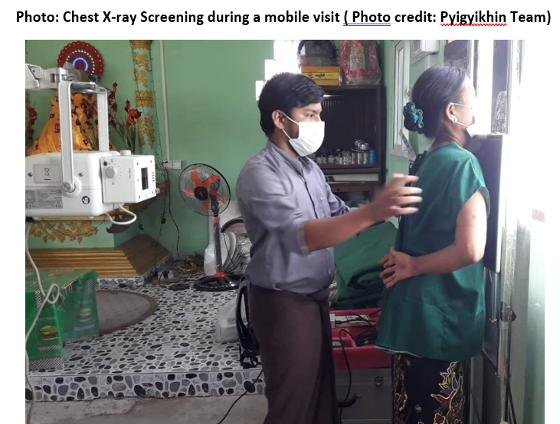
Transition of Active Case Finding of TB cases in Yangon during crisis
Chest X-ray screening during a mobile visit
Overview
TB problem in Yangon is huge, serious and very complex. TB prevalence continues to exceed 600/100000 population and 47 percent of the drug resistant TB are reported form the capital. Thirteen percent of the cases have TB-HIV coinfection. Proportion of TB cases detected that were screened for TB is high (91%). However, amongst people living with TB, 15 percent was started on Tuberculosis Preventive Treatment.
 |
To address the TB issue in Yangon, a more focused multisectoral and multi partner approach was required. As a result, “Yangon TB Consortium Project” was initiated in 2019 with four implementing partners (Myanmar Medical Association, Population Services International, Pyigyikhin, and Myanmar Anti-TB Association). The project functions under the leadership of the Regional Health Department through technical assistance of National TB Programme and WHO. At the township level, project activities are implemented under the supervision of Township health departments.
Active case finding of TB using mobile teams, and engagement with Public-Private Mix (PPM) clinics, engaging communities for treatment and adherence support are the main approaches of the consortium project. The project is being implemented in seven townships of Yangon. At each township, mobile sites are selected quarterly depending on TB burden and different factors such as presence of vulnerable population and congested slum areas.
Five mobile teams were recruited in this project. One mobile team has 5-6 team members (2 medical doctors for overall coordination and CXR reading/TB screening, 1 data assistant, 1 counsellor, 1 X-ray technician and 1 X-ray assistant).
Chest X-ray screening followed by sputum examination is used as screening algorithm of mobile teams, and people aged 15 years and above are invited for screening regardless of TB symptoms.
Community mobilization and invitation prior to mobile visits are conducted with the support of local administrative authorities, basic health service professionals (BHSP) and volunteers. Integrating TB screening in community based NCD clinics operated by basic health staff is also practiced.
Mobile team activities started from May 2019, but had to be suspended in March 2020 due to COVID-19 outbreak in Yangon as the city went on prolonged lock down. At the end of 2020, modified SOP of mobile team considering risk mitigation in COVID-19 settings was developed by National TB Programme with technical assistance of WHO. Mobile team activities were restarted in early 2021, however due to political conflict in the country, all mobile activities have been suspended since 1st February 2021.
The Active Case detection was effective in case finding. During the nine months of the project, over 45,000 people were screened. About 1,200 TB patients were detected. Among the diagnosed patients, 83% received TB treatment. Low participation of community in TB screening and refusal to treatment are found as major challenges in urban settings possibly due to TB stigma and specially when the cases are asymptomatic.
In times of political instabilities in Myanmar, there was minimum availability of public health services. During such times, “Mix clinics” under Myanmar Anti-TB Association have supported treatment continuation of TB patients. Treatment adherence support was ensured in collaboration with community partners. Currently, mobile team activities are redesigned into TB diagnostic facilities at charity clinics, community fever clinics and private sectors.
WHO team continues to promote and support efforts at community engagement and train the staff and volunteers to increase TB case finding, contact investigation, Infection Prevention and Control and TB Preventive Treatment (TPT). If the ongoing political crisis continues, the Mobile clinics will be remodeled into facility-based service outlets. Community Based TB Care (CBTBC) network will identify suspected cases and refer to these clinics for diagnosis of TB. CBTBC engagement and ownership will be the key to compliance and treatment success and above all to find missing TB cases in the community during these critical times.
